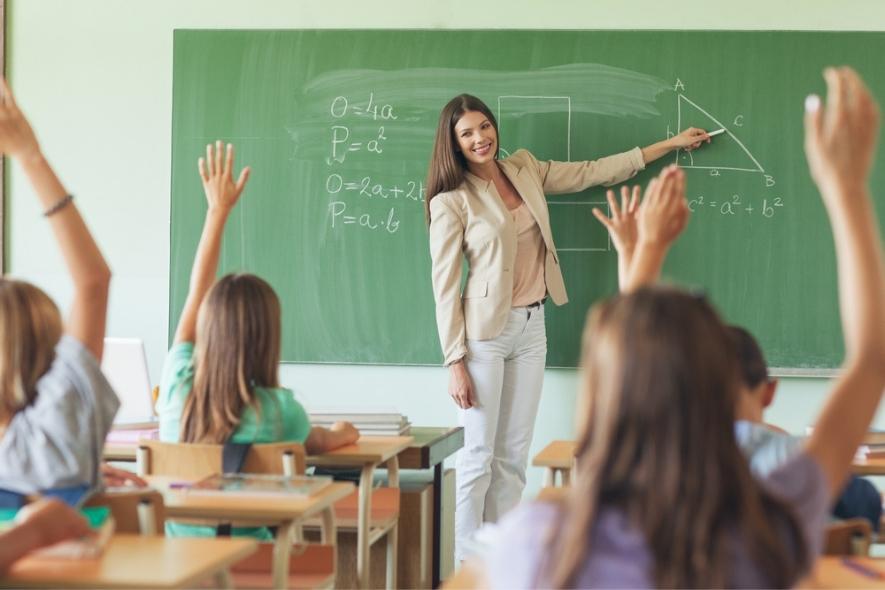The Best Primary Science Tuition Singapore for Effective Learning Methods
The Best Primary Science Tuition Singapore for Effective Learning Methods
Blog Article
Discovering the Various Training Approaches in Main Science Education Today
The landscape of key science education and learning is evolving, with numerous training techniques obtaining prestige in modern classrooms. Inquiry-based knowing, hands-on experiments, and the integration of technology are redefining how instructors involve young minds. In addition, joint methods and separated direction are being utilized to accommodate the diverse demands of pupils, improving both engagement and understanding. As we examine these methodologies, questions arise about their performance and the effects for future instructional techniques. What might these changes in method mean for the future generation of learners?
Inquiry-Based Knowing
Inquiry-Based Understanding (IBL) is a pedagogical strategy that urges pupils to check out clinical ideas with wondering about, investigation, and hands-on trial and error. This approach highlights the role of pupils as energetic participants in their learning, advertising important thinking and analytical skills. By engaging with real-world concerns, pupils become curious and inspired, which boosts their understanding of clinical concepts.
In IBL, educators act as facilitators, leading pupils as they browse their questions as opposed to delivering information directly. This student-centered method permits differentiation, fitting different finding out speeds and styles. Trainees establish skills in developing hypotheses, developing experiments, and examining information, which are crucial for scientific literacy.
Furthermore, IBL promotes partnership amongst pupils, encouraging them to share searchings for and concepts. This cumulative query promotes social abilities and a feeling of neighborhood within the class. In addition, the procedure of query encourages durability, as pupils learn to welcome failing as a stepping stone toward understanding.
Hands-On Experiments
Hands-on experiments are a crucial component of reliable science education, enhancing the principles of inquiry-based learning. These experiments permit trainees to engage straight with scientific concepts, cultivating a deeper understanding via experiential knowing. By manipulating products and observing outcomes, young learners can grasp abstract concepts in tangible methods.
Such activities promote crucial reasoning and analytical skills, as trainees assume results, conduct experiments, and analyze results. This procedure encourages them to ask concerns, improve their understanding, and establish a scientific way of thinking. Hands-on experiments can be customized to diverse understanding styles, making sure that all pupils have the opportunity to engage meaningfully with the material.
Moreover, hands-on experiments commonly urge cooperation among peers, promoting team effort and interaction abilities. Functioning in teams makes it possible for students to share ideas, talk about findings, and discover from each other, which improves their general academic experience.
Including hands-on experiments right into the key scientific research educational program not just improves the finding out setting yet additionally grows a long-lasting rate of interest in science. By actively taking part in their education, students are more probable to develop an interest for clinical questions that prolongs beyond the classroom.

Modern Technology Integration
Incorporating modern technology right into main science education and learning has come to be increasingly crucial in cultivating student engagement and enhancing discovering results. Making use of electronic tools, such as interactive simulations, online labs, and educational software, provides students with possibilities to discover clinical ideas in innovative ways. These sources promote a much deeper understanding of complicated topics by allowing students to picture and control variables that would be not practical in a traditional classroom setting.
Moreover, technology integration motivates individualized learning experiences. Students can progress at their very own rate, taking another look at tough concepts via multimedia sources, which accommodate different learning designs. This versatility not only sustains private development however also grows a sense of freedom in students.
Additionally, modern technology Learn More Here offers as a bridge to real-world science, linking students with existing research and specialist contributions. Access to scientific journals and online data sources broadens trainees' viewpoints on scientific inquiry and cultivates essential thinking abilities.
Collaborative Learning
Collective discovering plays a vital function in key science education by promoting teamwork and communication abilities amongst pupils. This method motivates students to function together, share knowledge, and participate in analytic, which boosts their understanding of scientific concepts. By joining group tasks, pupils find out to express their ideas, listen to diverse perspectives, and discuss remedies, every one of which are important skills in both scholastic and real-world contexts.

Research study indicates that collaborative learning can result in enhanced motivation and engagement in scientific research subjects, as students discover enjoyment in common experiences (primary science tuition Singapore). Furthermore, this method prepares pupils for future collective endeavors, outfitting them with the skills essential for resource effective synergy in college and specialist environments. Eventually, welcoming collaborative discovering in primary science education and learning can considerably improve the learning experience and promote a deeper understanding of clinical questions
Separated Guideline

Differentiated instruction can manifest in different methods, such as varying the material, procedures, or products of discovering. Instructors might make use of tiered tasks that supply varying levels of intricacy, permitting trainees to work at their respective preparedness levels. Additionally, adaptable organizing methods can help with collaboration amongst trainees with different abilities, cultivating peer understanding.
Evaluation plays an essential function in this method, as it educates direction and helps instructors recognize each trainee's special demands. Formative evaluations, such as monitorings and tests, can lead instructors in adjusting their methods to enhance finding out outcomes. primary science tuition Singapore. Inevitably, by executing differentiated direction in key science education and learning, educators can cultivate a much more reliable and equitable discovering environment, equipping all pupils to reach their complete potential in recognizing clinical phenomena
Final Thought
In recap, the diverse teaching techniques in key science education and learning, consisting of inquiry-based learning, hands-on experiments, innovation assimilation, collaborative discovering, and distinguished direction, jointly add to a more effective knowing setting. These approaches advertise vital reasoning, analytic abilities, and a deeper comprehension of scientific ideas. By carrying out these strategies, teachers can produce helpful and interesting class that resolve the diverse demands of Read More Here students, eventually cultivating a long-lasting interest in scientific research and enhancing scholastic achievement.
Inquiry-Based Knowing (IBL) is a pedagogical method that encourages students to explore clinical principles through questioning, examination, and hands-on trial and error.Collective understanding plays a vital function in primary scientific research education by fostering team effort and communication skills amongst trainees.Research study indicates that joint discovering can lead to boosted inspiration and interaction in science topics, as pupils locate satisfaction in common experiences.In fostering a comprehensive learning setting, separated direction arises as a crucial strategy to suit the diverse demands and capabilities of students in key science education and learning. Eventually, by implementing set apart direction in key science education and learning, teachers can grow a more efficient and equitable understanding atmosphere, empowering all trainees to reach their complete capacity in understanding clinical phenomena.
Report this page